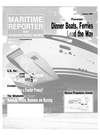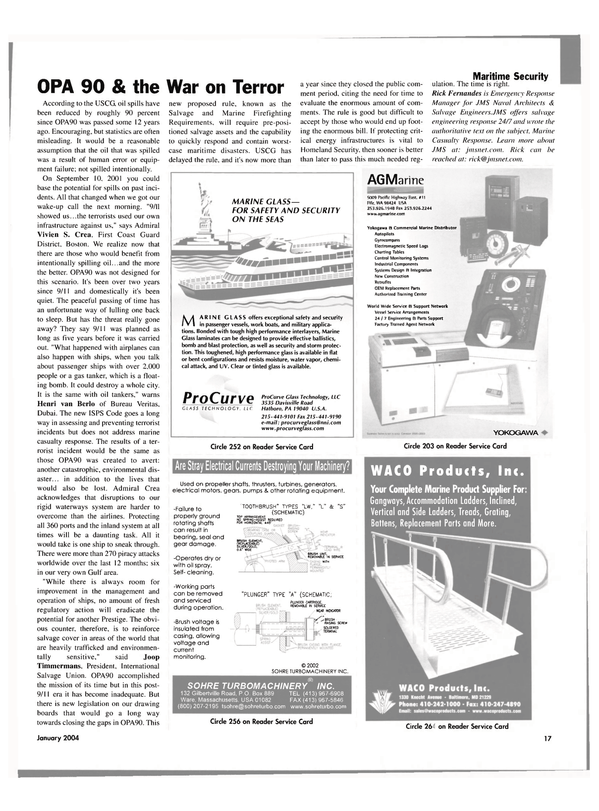
OPA 90 & the War on Terror
According to the USCG, oil spills have been reduced by roughly 90 percent since OPA90 was passed some 12 years ago. Encouraging, but statistics are often misleading. It would be a reasonable assumption that the oil that was spilled was a result of human error or equipment failure; not spilled intentionally.
On September 10, 2001 you could base the potential for spills on past incidents.
All that changed when we got our wake-up call the next morning. "9/11 showed us...the terrorists used our own infrastructure against us," says Admiral Vivien S. Crea. First Coast Guard District, Boston. We realize now that there are those who would benefit from intentionally spilling oil...and the more the better. OPA90 was not designed for this scenario. It's been over two years since 9/11 and domestically it's been quiet. The peaceful passing of time has an unfortunate way of lulling one back to sleep. But has the threat really gone away? They say 9/11 was planned as long as five years before it was carried out. "What happened with airplanes can also happen with ships, when you talk about passenger ships with over 2,000 people or a gas tanker, which is a floating bomb. It could destroy a whole city.
It is the same with oil tankers," warns Henri van Berlo of Bureau Veritas, Dubai. The new ISPS Code goes a long way in assessing and preventing terrorist incidents but does not address marine casualty response. The results of a terrorist incident would be the same as those OPA90 was created to avert: another catastrophic, environmental disaster...
in addition to the lives that would also be lost. Admiral Crea acknowledges that disruptions to our rigid waterways system are harder to overcome than the airlines. Protecting all 360 ports and the inland system at all times will be a daunting task. All it would take is one ship to sneak through.
There were more than 270 piracy attacks worldwide over the last 12 months; six in our very own Gulf area.
"While there is always room for improvement in the management and operation of ships, no amount of fresh regulatory action will eradicate the potential for another Prestige. The obvious counter, therefore, is to reinforce salvage cover in areas of the world that are heavily trafficked and environmentally sensitive," said Joop Timmermans. President, International Salvage Union. OPA90 accomplished the mission of its time but in this post- 9/11 era it has become inadequate. But there is new legislation on our drawing boards that would go a long way towards closing the gaps in OPA90. This new proposed rule, known as the Salvage and Marine Firefighting Requirements, will require pre-positioned salvage assets and the capability to quickly respond and contain worstcase maritime disasters. USCG has delayed the rule, and it's now more than a year since they closed the public comment period, citing the need for time to evaluate the enormous amount of comments.
The rule is good but difficult to accept by those who would end up footing the enormous bill. If protecting critical energy infrastructures is vital to Homeland Security, then sooner is better than later to pass this much needed reg- ulation. The time is right.
Rick Fernandez is Emergency Response Manager for JMS Naval Architects & Salvage Engineers.JMS offers salvage engineering response 24/7 and wrote the authoritative text on the subject, Marine Casualty Response. Learn more about JMS at: jmsnet.com. Rick can be reached at: [email protected]
Read OPA 90 & the War on Terror in Pdf, Flash or Html5 edition of January 2004 Maritime Reporter
Other stories from January 2004 issue
Content
- Novatug Launches Carrousel Winch Tug page: 3
- Cruise Ship Engineers Indicted page: 10
- Places of Refuge and Ship Recycling page: 11
- Teekay Sees Amended Regs as Positive page: 12
- Thomas B. Crowley Sr., Scholarships Presented page: 13
- Kongsberg Launches DPS for Workboat Market page: 14
- REPAIR STANDARDS Standardizing Contracts page: 16
- "Happy" New Year? page: 16
- OPA 90 & the War on Terror page: 17
- Recycling of Ships page: 18
- Fast Ferries Still a Core Market for Austal page: 20
- Image Marine to Build New True North page: 22
- Integrated Mooring Systems: The Way of the Future page: 23
- Ferry Boat Interiors page: 24
- Passenger Vessels: What's in Store in 2004? page: 25
- Make Emission Reductions Pay for Themselves page: 30
- Adding Combat Power; Extending Ship Life page: 32
- VT Halmatic Completes Massive Yacht Mast page: 35
- Will there be a Feeder Frenzy? page: 36
- The Art of Maneuvering page: 37
- GE M&SP Makes Strong Maritime Push page: 38
- Q&A with Hapag-Lloyd Chief Superintendent Engineer Klaus Marek page: 40
- Titan 2 Refurb Delivers Unexpected Benefits page: 41
- Severn Trent De Nora to Supply Rigdon OSV's page: 46
- Simrad Co-Founder Willy Simonsen Dies page: 47
- C-Map Names Distributor of Singapore ENC Data page: 48
- Ship Knowledge A Modern Encyclopedia page: 51


